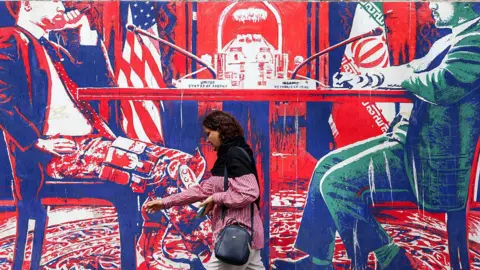Iran says it is ready for nuclear deal if US stops military threats
 AFP
AFPIran is ready to engage with the US at talks on Saturday over its nuclear programme "with a view to seal a deal", its Foreign Minister Abbas Araghchi has said.
But US President Donald Trump must first agree there can be no "military option", Araghchi said, and added that Iran would "never accept coercion".
He also insisted the negotiations in Oman would be indirect, contradicting Trump's surprise announcement on Monday that they would be "direct talks".
Trump, who pulled the US out of a 2015 nuclear deal between Iran and world powers during his first term, warned that Iran would be in "great danger" if talks were not successful.
The US and Iran have no diplomatic ties, so last month Trump sent a letter to Iran's supreme leader via the United Arab Emirates. It said he wanted a deal to prevent Iran from acquiring nuclear weapons and to avert possible military strikes by the US and Israel.
Trump disclosed the upcoming talks during a visit to the White House on Monday by Israeli Prime Minister Benjamin Netanyahu, who said on Tuesday that both leaders had agreed "Iran will not have nuclear weapons" and added "the military option" would happen if talks dragged on.
Iran insists its nuclear activities are entirely peaceful and it will never seek to develop or acquire nuclear weapons.
However, Iran has increasingly breached restrictions imposed by the existing nuclear deal, in retaliation for crippling US sanctions reinstated seven years ago, and has stockpiled enough highly-enriched uranium to make several bombs.
The US president told reporters in the Oval Office on Monday that this weekend's meeting in Oman would be "very big".
"I think everybody agrees that doing a deal would be preferable to doing the obvious," Trump said.
But he also warned that it would "be a very bad day for Iran" if the talks were not successful.
In an opinion piece published by the Washington Post on Tuesday, Iran's foreign minister declared that it was "ready to engage in earnest and with a view to seal a deal".
"We will meet in Oman on Saturday for indirect negotiations. It is as much an opportunity as it is a test," Araghchi said.
Iran harboured "serious doubts" about the sincerity of the US government's intentions, he noted, citing the "maximum pressure" campaign of sanctions that Trump restored soon after starting his second term.
"To move forward today, we first need to agree that there can be no 'military option', let alone a 'military solution'," he said.
"The proud Iranian nation, whose strength my government relies on for real deterrence, will never accept coercion and imposition."
Araghchi insisted there was no evidence that Iran had violated its commitment not to seek nuclear weapons, but also acknowledged that "there may exist possible concerns about our nuclear programme".
"We are willing to clarify our peaceful intent and take the necessary measures to allay any possible concern. For its part, the United States can show that it is serious about diplomacy by showing that it will stick to any deal it makes. If we are shown respect, we will reciprocate it."
"The ball is now in America's court," he added.
Iran's hard-line Tasnim news agency said Araghchi would head the country's delegation at the Oman talks, underlining their importance.
The BBC's US partner CBS News meanwhile confirmed that Trump's Middle East special envoy Steve Witkoff would lead the US side, and said America was continuing to push for the talks to be direct.
During the first set of meetings, the US was expected to call on Iran to fully dismantle its nuclear programme and, depending on how negotiations went, technical experts were then expected to follow up in additional talks, it said.
US officials have so far revealed few details about Trump's demands.
However, after Witkoff said in a recent interview that Trump was proposing a "verification programme" to show Iran is not pursuing nuclear weapons, National Security Adviser Mike Waltz clarified the goal was "full dismantlement".
Israel's prime minister echoed Waltz's stance in a video on Tuesday, saying he wanted a "Libyan-style" agreement - a reference to the North African country's decision to dismantle its nuclear, biological and chemical weapons programmes in 2003.
"They go in, blow up the installations, dismantle all of the equipment, under American supervision and carried out by America," Netanyahu explained.
He then said: "The second possibility, that will not be, is that they drag out the talks and then there is the military option."
Israel, which is assumed to have its own nuclear weapons but maintains an official policy of deliberate ambiguity, views a nuclear Iran as an existential threat.
Netanyahu said last year that Israel had hit an Iranian nuclear site in retaliation for a missile attack.
A senior official at Iran's foreign ministry told the BBC that it would never agree to dismantle its nuclear programme, and added the "Libya model" would never be part of any negotiations.
The 2015 deal that Iran reached with then-US President Barack Obama's administration, as well as the UK, France, China, Russia and Germany, saw it limit its nuclear activities and allow inspections by the International Atomic Energy Agency (IAEA) in return for sanctions relief.
However, in 2018, Trump unilaterally abandoned the agreement, which he said did too little to stop Iran's potential pathway to a bomb.
Iran then increasingly breached the agreement's restrictions. The IAEA warned in February that Iran had stockpiled almost 275kg (606lb) of uranium enriched to 60% purity, which is near weapons grade. That would theoretically be enough, if enriched to 90%, for six nuclear bombs.
